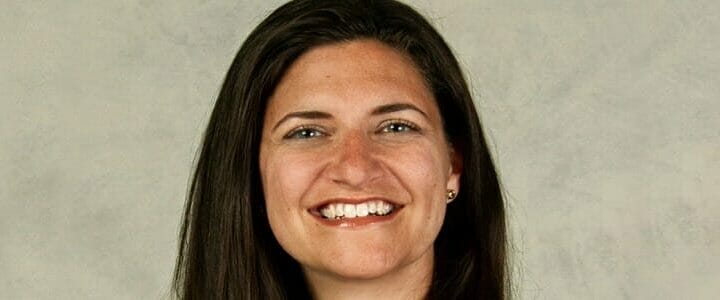As Booz Allen’s chief information security officer (CISO), Rebecca McHale oversees the firm’s strategy for protecting information and technology assets. Prior to joining Booz Allen, was the CISO for Blackboard Inc., a global educational technology and services company. She also held senior cybersecurity leadership roles at Novetta and CSRA. Rebecca earned a B.S. in mathematics from University of Mary Washington and an M.S. in discrete mathematics and computing applications from Royal Holloway, University of London.
How did you get started in cybersecurity?
Math was always the subject I liked most. I was a math major in college, and my senior year I did an independent study in cryptography. That was the game changer for me.I pursued my master’s degree in a related subject, and then moved to Washington, DC for a job in cryptography. I worked for a government contractor, SRA International, where I conducted security assessments, managed Public Key Infrastructure (PKI) teams, and oversaw security operation centers. My career naturally progressed, but it all started with an interest in math and crypto.
What cyber accomplishment are you most proud of?
Most of them stem from significant security incidents where I oversaw response efforts. Those are chaotic periods, but managing the chaos and focusing on communication and collaborating during times of crisis—not just technology staff but those in legal, marketing, and functional leaders—and emerge as a more cohesive team is a good feeling.
I am also proud of the protection measures we put in place that make clients stronger in the end.
According to research, 51% of women in cybersecurity have faced discrimination. Have you experienced this and how do you recommend overcoming it?
Many years back, I met a colleague for the first time. Within 15 minutes of meeting me, and having no conversation about work, he stated that I was not as technical as my predecessor.
I aim to be mindful of the potential for discrimination, but not allow it to create my own biases in an interaction.
In terms of overcoming possible discrimination, I think it comes down to self-confidence. I have always worked that much harder and become a bit more knowledgeable about the things I don’t know as well as others or feel less certain about. Better yet, I surround myself with people who are knowledgeable and I learn from them. That drive to learn enables me to approach conversations without hesitation, to use my voice, and share my viewpoint. I also try to stay aware of moments when I doubt myself or have imposter syndrome—and take those opportunities to shift internal dialogue to reflect strengths I bring to the table.
What advice do you have for women new to cybersecurity or those looking for a new challenge?
I find many people do not hold traditional technology degrees but still have great success. This is particularly relevant with women, as so many drop out of STEM learning—a problem that needs everyone’s attention. These young women may not pursue degrees in science, math, or engineering fields—but they still have the skills to achieve a successful cybersecurity career.
When I think of the people who worked for me throughout the years, they encompass a full range of different degrees and varied professional backgrounds—from international affairs to graphic design. In the end, different backgrounds make for a diverse group that brings a lot of differing perspectives.
Do you want to find a job like Rebecca’s? Booz Allen’s people-focused culture is a cornerstone of their history and how they’re able to create an amazing workplace. Learn more by exploring their current openings.




